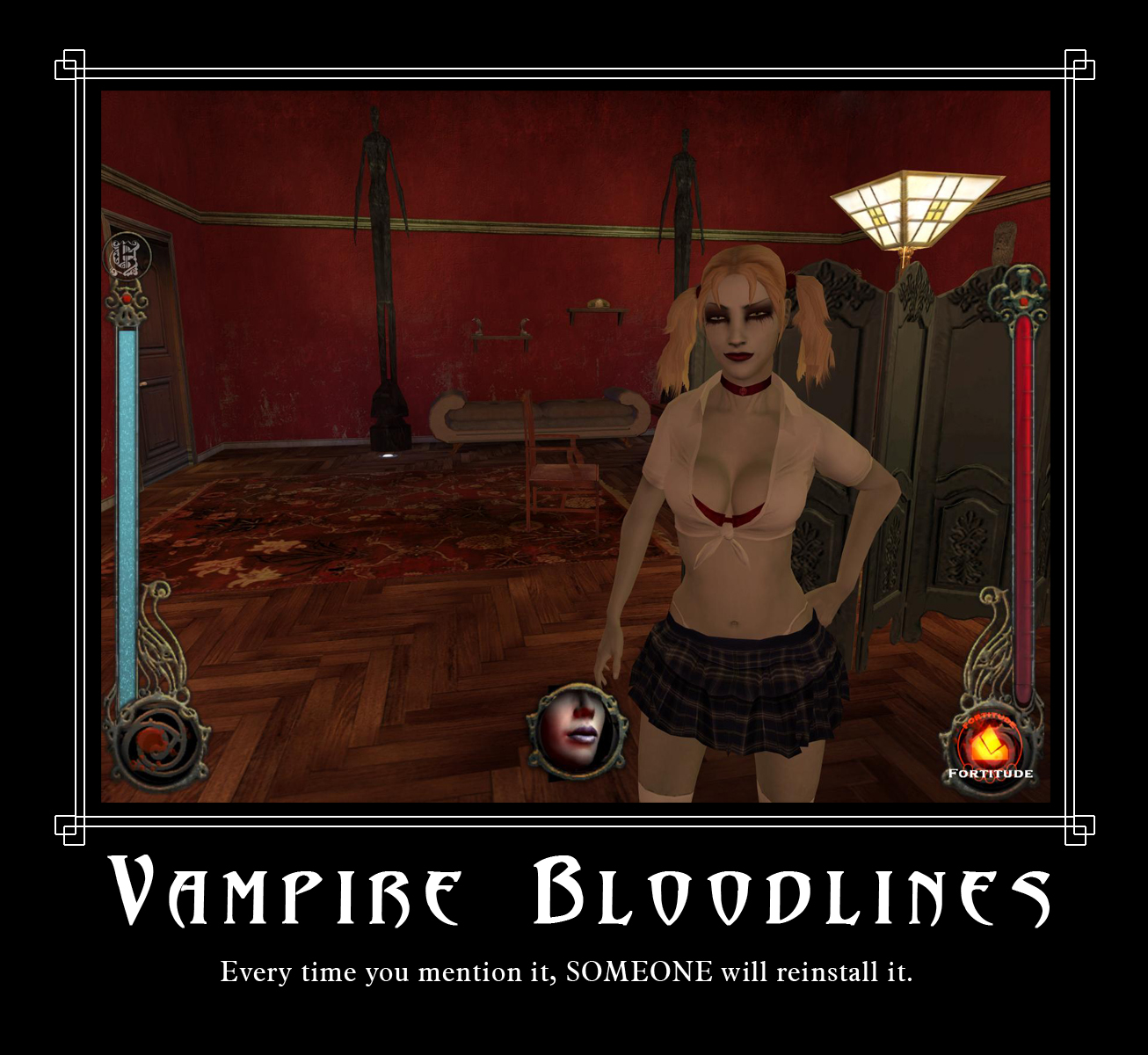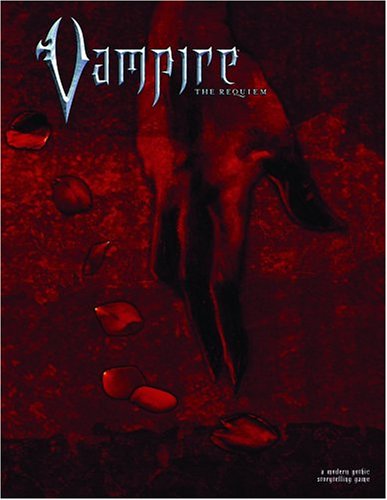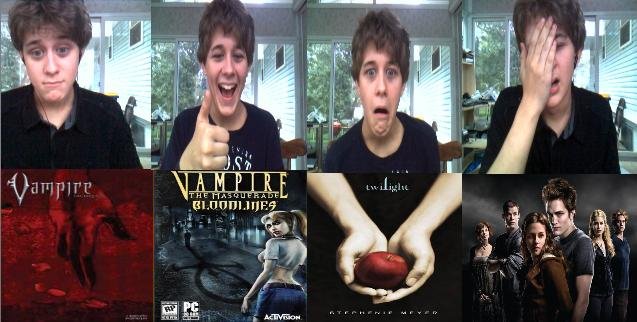Hello, readers!
As you may or may not know, over the last couple of years White Wolf has been working on making 20th anniversary editions of some of their classic lines. Referred to as the old World of Darkness (or Classic), these lines gathered enough of a following in the 90's to sit themselves as probably the second most popular line of roleplaying games after Dungeons and Dragons. Vampire the Masquerade started the charge, and the setting expanded to include werewolves, mages, ghosts, mummies, demons, the Fae...
Yeah, it was a veritable monster mash drenched in grunge, leather, tattoos, and conspiracy.
I was quite a fan of Masquerade, even though I got into the hobby when these books were out of print and the new World of Darkness was just starting. The video game, VtM: Bloodlines, is what really drew me in and I dug up some old books to quench my growing curiosity about this interpretation of the creatures of the night. Thankfully, this pulled me into the Vampire fandom before Twilight came and bred disgust and anger. While I didn't run or play a lot of it, Masquerade always held a special place in my heart, even after Requiem came out.
Why were they changing everything, I wondered? What was wrong with the Camarilla, Anarchs, and Sabbat? Was the Cain legend too definitive for the modern day where we can't be really sure of anything anymore? It seems I was blissfully unaware of one major thing that the World of Darkness lines had that eventually spelled their doom.
Metaplot.
For those of you who don't know, this basically means that, in the established setting, things changed between books as things moved in the fiction. Major NPCs did things, powers came in and out of fashion, Clans joined and left organizations, and every edition or book seemed to scramble things a little and all lead to some sort of end-of-the-world scenario for each line. Of course, this end-of-the-world needed to be spelled out at some point, and in 2004, the meta-plot ended with three novels and books that presented the Storyteller with some ideas on how to map out Gehenna, or the Apocalypse, or whatever flavor of Armageddon your horror monster was facing.
According to those older than I was, this metaplot became incredibly confusing, and if you didn't buy almost every book that came out from White Wolf for your line of choice, it was easy to get lost. Things became more and more ridiculous, and things fell apart until most people were convinced that the metaplot needed to either be ignored or thrown out.
While what happened to White Wolf was likely a result of poor planning and too many chefs in the kitchen, that left me in an interesting place, because the idea of a metaplot was intriguing to me. You mean, a setting can change organically from the powers that be? It was a new and exciting idea to me, that settings can evolve. A familiar sandbox could grow, or have new toys, or at least different toys, maybe even based on input from the community?
That leads me to this question: is metaplot in a setting a bad thing? I don't think that is necessarily so. It is tricky, and has a lot of negative points, but maybe a well-handled meta-plot could even enhance a game line, or give it direction that it was lacking.
Let's bring this to Vampire, since it is the setting I'm most familiar with in the White Wolf scheme of things. Requiem brought with it a setting that erased the definitive nature of the metaplot. No more scheming Elders, no more Cain, no more over-arching Camarilla, no more Gehenna. No one knows how Vampires came to be, but all these organizations have different ideas and methods on how to run things, and they all coexist and battle out for supremacy, city by city. This made the game completely customizable, which is great.
But, something was missing. Comparing the two side-by-side, I feel like I have more of an idea about what sort of game I could run in Masquerade rather than Requiem. Sometimes, there is a thing as too much freedom, and I got that feeling while reading a lot of the other new World of Darkness lines. Take out the Wyrm, and what do Werewolves do? I guess they're just... Spirit police? Don't even get me started on Changeling. I was more Lost than they were when trying to puzzle out what kind of stories you can tell from the base book alone. It was an overwhelming feeling of, "That's great...Then what?"
The White Wolf examples aside, there are a lot of problems inherit with metaplot. While it can add great flavor, it also potentially detracts from changes to the setting that happens organically in game. Oh, your players killed the Prince, who in this new book, leads some sort of revolution? Whoops. Your players took down the Camarilla in Paris? Guess this new thing doesn't make sense now. The setting can never truly take account of your characters because the publishers likely don't know about them, so whether they are major power players or not, things will happen without them to a pre-determined end. That takes a lot of wind out of the players sails, even if the Storyteller edits the new developments to fit your version of the setting. It almost feels like it doesn't matter what you do since the setting moves on and ends without you, potentially.
That argument could be countered by the 'Use what you want' rule that most of these books implied, but the feeling could still remain.
Metaplot is also hard to keep track of. Settings are often broad, and if handled in the White Wolf fashion which slapped something new into almost every book (and there were a lot of them), it is incredibly easy to lose people under the weight of new developments. It does have the benefit of creatively using justifications in the setting to explain new rules in an edition update, but that could be outweighed by the amount of stuff you miss if you just buy a couple supplements and not all of them. Roleplaying books are expensive, even in the advent of Drive-Thru RPG and the like. Does a company really want to force a player to buy everything to see how things progress?
Heh, kinda sounds like comic book series. Not that those settings ever evolve...
Anyway.
Detractors aside, I think a setting could really benefit from some smart ideas regarding this concept. Maybe books that advance the metaplot could be written in a way that emphasizes the players rather than established NPCs? Maybe the creators could regularly poll its community to see what developments they want to see? Maybe some of these books could come with clearly defined options for what happens next, almost like how White Wolf handled the 'End-of-the-world' books?
I don't know, but I think there's untapped potential in an experiment that may have horribly backfired and ruined a line in the past. This is the age of the internet! Companies interact with their communities now more than ever, especially when it comes to role-playing with the advent of small press. Push the boundaries of setting, developers! Don't just define, refine, change!
Okay, that's enough ranting. I hope you enjoyed this article. If not, here's a funny picture.
-Wes




No comments:
Post a Comment